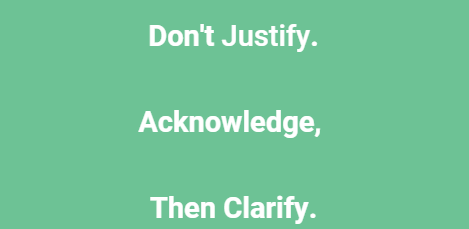We’ve all experienced that horrible, sinking feeling of realisation that something we thought was okay turns out to be far from it. In our personal and professional lives, we all make mistakes in word and action. When we identify the error (or have it pointed out to us), our default response is often to justify our position. Here’s why that happens and why it is important to resist that defensive urge.
I’ve had to admit to failings many times (usually multiple times daily) in my personal life. Practicing this has made me better at it, but I can still fall into the bad old habit of deflecting or justifying when my wife finds the immersion has been left on. I may have even, on occasion, suggested that one of my daughters was responsible (particularly if I’m not sure that it was me). One of the things that made it easier was identifying why I react defensively when I’m wrong.
Defensive and deflecting behaviour manifests itself when we feel threatened in some way. We may feel that our status or reputation is under threat, or that we’re at risk of social rejection. Our limbic system kicks in to produce a response before our rational brain, and suddenly we’re in an entrenched position. “Your Brain at Work” by Dr David Rock provides some wonderful examples of how this limbic system hijacking can occur without us being aware of it.
In a work context, we often respond negatively (and defensively) when we (or the teams we’re responsible for) come under actual or perceived attack. This can be because of how the other party presents the issue; some workplaces are quite combative, and the suggestion of failure can be a weapon to use to gain an advantage.
A defensive response on our part can also be driven by insecurity. If we’re uncertain of our position, which can happen due to a lack of psychological safety, we may rush to justify what has occurred.
What happens in both professional and personal situations if we rush to defend our position? We shut down dialogue, and close off opportunities for learning. We lose the ability to hear what may be a valuable lesson or point from our interlocutor. We can also damage our standing in leadership circles, or hurt a personal relationship.

What should we do to short-circuit the threat response? While it can be challenging, due to the speed of the amygdala-driven response (believed to be about 10x faster than the neocortex gets access to information), we can recognise the signs that we’re responding emotionally rather than rationally. When we feel threatened, our bodies get ready for “fight, flight or freeze“. Our heart rate elevates, our faces feel flushed, and our hands may form into fists. We may feel sweaty or clammy. Our voices rise, our vocal cords tighten, and we can feel the hair on the back of our necks stand up. These are all signs that we’re reacting rather than thinking.
The mere noticing of these symptoms of emotional hijacking can give us enough time to respond more thoughtfully. One of the first things we can do is acknowledge the point that the other person has made. It doesn’t mean we agree with them (yet), merely acknowledging the point that has been made. This then gives us the chance to clarify the issue being raised. We then have the opportunity to rationally and more calmly accept that we are wrong or to politely disagree while explaining our rationale. This rationale should not include justification if we are indeed wrong 🙂
While this approach won’t always avoid negative impacts to relationships or reputation, it will increase the likelihood of positive outcomes. Here’s to more practicing!
|
|

